Today’s posts comes from Robert Rosenbaum’s blog “From the Seat of My Bike.” This year Robert participated in his fifth Israel Ride
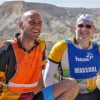

Today’s posts comes from Robert Rosenbaum’s blog “From the Seat of My Bike.” This year Robert participated in his fifth Israel Ride
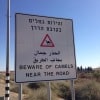
Rabbi Lev Herrnson, 2014 Israel rider, explores his experience on the Israel Ride and his connection to the wilderness of Israel’s south.
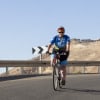
Thinking about registering for the 2015 Israel Ride, but not sure what it will be like? Read below for first hand accounts of day by day riding! Today’s blog features a post from Betsy Diamant-Cohen
Marcy Perlman Tardio rode on the 2014 Arava Institute & Hazon Israel Ride. She is a mother, grandmother, and homebirth midwife living in Brooklyn. This piece was originally published online at Haaretz.com on December 1st, 2014. Many within my multi-cultural circle of family and friends refused to support my participation in a charity bike ride in Israel, an ‘oppressor’ and ‘colonialist’ state. The year following my kidney transplant, over a decade ago, I rode in the Hazon charity bike ride in New York. I rode then to honor my older son, who had gifted me the kidney, and to celebrate my new-found health. Through the organizers I learned of a counterpart ride that took place in Israel; several weeks ago, I returned from the Hazon-Arava bike ride, where I completed 230 miles from Jerusalem to Eilat. Despite the challenges of the heat and the terrain, my most unexpected difficulty had emerged before I even sat in the saddle: Persuading my peers to donate to a charity effort that would take place in Israel. At the time of my first ride I had joined a synagogue. My younger son already attended Jewish day school. I, the daughter of culturally Jewish, left wing, secular […]
Missing the 2014 Israel Ride?…Wondering what it would be like to join us on the 2015 Israel Ride? Read below for first hand accounts of day by day riding!
Rabbi Steve Golden reflects on his experience of riding on the 2014 Arava Institute & Hazon Israel Ride in memory of his friend, with inspiration from Israel and the Torah portion.
We did it! Riding from Jerusalem to Eliat in a week’s time, this year’s Israel Ride community has an incredible journey. On our final day of riding, participants cycled into Eliat and along the coast before joining staff and crew for a beach celebration. Registration for the 2015 Israel Ride is open and I encourage anyone interested to sign-up now! The ride will run October 27th through November 3rd 2015. If you sign up now you will receive an early registration discount, a complimentary Israel Ride wind breaker and a guaranteed spot on the 2015 Israel Ride. Click here to register now! Still not convinced? Check out these rider blogs from this year to read more about the experience! http://lesterdb.blogspot.co.il/ http://reuvenmr.blogspot.co.il/ Thank you for reading! Hope to see you next year.

After a restful Shabbat riders returned to their bikes to complete the final two days of riding on the Israel Ride. Starting the day with an incredible sunrise and descent from Mitzpe Ramon, participants rode through the desert to Kibbutz Ketura, the home of the Arava Institute. Throughout the week riders have had the opportunity to meet Israelis, Palestinians, and Jordanians – Arava Institute and Hazon alumni on the Israel Ride crew who are working towards peace, environmental sustainability, and regional cooperation. These alumni have shared their stories throughout the week and today our Israel Ride community was able to visit the faculty and staff who supported them along their way.
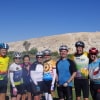
Yesterday the Israel Ride entered the heart of the desert. Participants rode past magnificent desert vistas and ate lunch at Sde Boker, the burial place of David Ben Gurion, the first Prime Minister of Israel. While the Shomrim hiked to a beautiful desert spring in the afternoon, the Chalutzim took a detour to the Egyptian border. All three groups were greeted at the end of the day by one of the most breath-taking sites of the trip, Mitzpe Ramon. After three days of riding, our community is enjoying a restful and rejuvenating Shabbat. Today riders have the option to participate in communal prayer, discussions, hikes and yoga. After lunch there will also be opportunities to learn more about the work of Hazon and the Arava Institute. These organizations encourage sustainability, peace and service in Israel and America. The Arava Institute exists to ensure that the world’s environmental resource challenges are a catalyst for dialogue, cooperation and trust among people. Located in Southern Israel, this specialized academic institute prepares young Israeli, Palestinian, Jordanian and international leaders to cooperatively address the region’s environmental needs. Hazon similarly promotes sustainability by creating healthier communities in the Jewish world and beyond. Hazon does so by […]
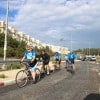
As we started our second day of riding and touring on the Israel Ride we traveled south through the Yatir Forest, a large Jewish National Fund forest, click here to read more!
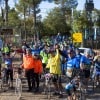
On our first day of riding we set off just as the sun rose above the Jerusalem skyline. As 165 participants took to their bikes to ride in support of peace and sustainability it was truly a sight to behold. To read more about the day click here!

Welcome to the Israel Ride Blog! Over the next week, this blog will feature stories and photos from the route, as I travel with the riders as they pedal from Jerusalem to Eilat click here to read more!
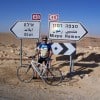
Jon Harris-Shapiro, two-time Israel rider, talks about going on the Israel Ride for an adventure and returning with that – and so much more. Jon will be on the 2014 Israel Ride in November.
Mark Segal, three-time Israel rider, talks about visiting Israel for the first time as part of the 2011 Israel Ride, and offers some advice for riders experiencing Israel for the first time.

Falynn Schmidt will be riding on her third Israel Ride in the fall. You can read this post and others on her blog “Baynim“ This year is auspicious, although I probably said that last year too. Last year my Gregorian calendar (May 26) and Hebrew calendar (Sivan 16) birthdays aligned, which only happens once every 19 years (auspicious, right?). I am announcing the auspiciousness again because this year is my last in this most memorable of decades. [1] I am not quite ready to head into the next 10 years, however I, please G/d, plan to use the next 12 months to prepare myself. To celebrate my birthday, I hope to do what I have done for the past three years, which is to ride my bicycle several hundred miles over the course of several days. It is this most childish of sports, indeed the only sport I learned to do in my childhood, that sustains my physical and mental health, makes me feel (and I dare say look) younger than my years, and gives me a grand goal of riding 400 miles. I will picture myself, wind in my pigtails, tush on a banana seat, turquoise tassles streaming from […]
The Arava Institute for Environmental Studies is the premier environmental academic and research program in the Middle East.
Friends of the Arava Institute
896 Beacon Street
Boston, MA 02215
info@friendsofarava.org | 617.266.7100
Please send all donation checks to the Friends of the Arava Institute.
Hazon means vision. We create healthier and more sustainable communities in the Jewish world and beyond.
Hazon
125 Maiden Lane, Suite 8B
New York, NY 10038
info@israelride.org | 212.644.2332 x302
Please contact Hazon with questions about the Israel Ride

